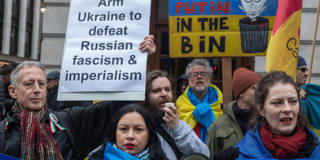OnPoint Subscriber Exclusive
The Big Picture brings together a range of PS commentaries to give readers a comprehensive understanding of topics in the news – and the deeper issues driving the news. The Big Question features concise contributor analysis and predictions on timely topics.

Everything Flows in Ukraine
Wars usually end at the negotiating table. But with Ukraine and its Western backers – which have been furnishing increasingly heavy weaponry – fearing that peace talks without a full withdrawal of Russian forces would effectively reward aggression, how can further escalation be avoided?
Shlomo Ben-Ami of the Toledo International Center for Peace acknowledges that a negotiated settlement is far from ideal. But, he warns, “those who resist imperfect peace – remaining committed instead to a ‘just peace,’ achieved, presumably, through the outright defeat of their opponents – often end up worse off.” With the Ukrainians “closer to exhaustion than their Russian opponents” – owing not least to their smaller pool of potential fighters – this is a real risk for Ukraine today.
But, as The New School’s Nina L. Khrushcheva reminds us, peace with Russia would carry a high price – not least for whomever negotiates it. If Ukrainian President Volodymyr Zelensky is to be “persuaded to grant concessions to a regime that has decimated his country’s infrastructure and annexed more of its territory, those encouraging him must devise a plan….that mitigates any and all offensive threats from Russia” – and “be willing to stand by it for years to come.”
Frans Timmermans, Executive Vice President of the European Commission, does not think it will come to that. Instead, he urges the West to deliver to Ukraine “the means to force Russian troops to return to Russia and stay there” – the sooner, the better. Only when Ukraine’s territorial integrity is restored can negotiations begin.
But, according to Richard Haass of the Council on Foreign Relations, “it is far from clear that Ukraine can eject Russia from its territory, even if Western governments shed their inhibitions and supply Ukraine with more advanced arms.” With Russian forces “simply too poorly trained and led to defeat Ukraine on the battlefield,” and conditions “far from ripe for diplomacy,” the most likely scenario, in his view, is for the war to drag on. “The year ahead promises to be dismal, not decisive – more reminiscent of World War I than of World War II.”
Princeton’s Harold James, however, challenges the “endless-war scenario,” which “follows from the common assumption that the future is mostly a continuation or extrapolation of the past” – an assumption that does not necessarily apply in “emergencies and exceptional states.” In fact, a “stable peace is much more likely than many commentators seem to believe,” because, as Russia’s own history shows, “mismanaged and ill-conducted wars can destroy the political establishment, create instability, compel reforms, and ultimately produce regime change.